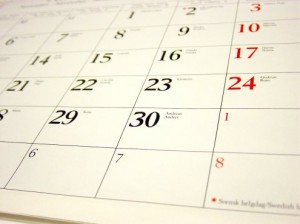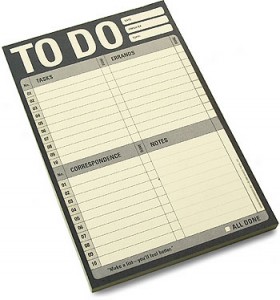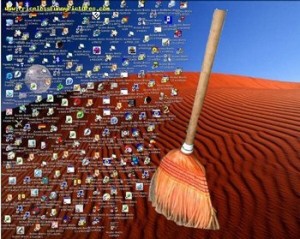CASS DA RE
<Staff Writer>
Summer makes us happy. It may be the increased Vitamin D intake, the great weather, the slushy cocktails, and/or all the extra free time. It is easy to be happy in the summer; quite simply, there is a lot less to be unhappy about. There are no goliath readings, exam summaries, essays, interviews, icy roads, or pressure-filled demands.
Of course, since you are reading this, summer days have past. The warm, rosy glow of the August sun has set, only to be replaced by the cool and awkward tone of fluorescent lighting. It’s back to school, and somehow, it’s not as fun as the commercials make it seem.
Alas, not all hope is lost. There are things that you can do to make the summer to fall transition a little easier, and thus make yourself a little happier. Osgoode, your Happiness Challenge is this: Get Organized.
There are number of psychological benefits to being mindful and creating order for oneself. While you may not enjoy cleaning out the junk drawer at your desk or rearranging your bookshelf, the final result will provide a sense of achievement and immediate gratification. Studies show that organized people are happier. A number of explanations have been proffered to explain this causal relationship, such as:
Organized people work more effectively and complete tasks quicker, thus providing a sense of accomplishment
- Organized people gain a sense of inner peace through outside order
- Organized people are less likely to procrastinate and miss deadlines, thus avoiding reproach
- Organized people are more likely to earn more money and be promoted more quickly
- Organized people benefit from a heightened sense of control and power
- Organized people live longer and are more conscientious, which is commonly cited as a factor in “life happiness”
Regardless of the exact reason or formula hypothesized, the bottom line is: establishing order in one’s personal and professional space will have a number of positive benefits, one of which is happiness. The start of new school year is an excellent time to revamp your organizational system. The academic term is fast, stressful, and always busy. Therefore, it is particularly important to invest a little extra time in these first few weeks of school to ensure long-term success.
In the upcoming days, try to reassess your organization system. Is it working for you? Do you find yourself with a stack of papers at the corner of your desk that may or may not contain last month’s electricity bill, a Holiday Card, last year’s Trademark’s syllabus, and this year’s timetable? Organizational experts, (yes, that is a real job), have a number of suggestions to get you on the right (and uncluttered) path this year. As part of this week’s Happiness Challenge, pick at least one of the following principles of organization, and stick to it. The key to organization is constant conscientiousness, which is easier to do than to say. At the end of the day, you will have a much more attractive workspace and happier state of mind.
1. Calendar
 While it is great that you can set up class time alerts on your phone, use desktop post-its for appointments, and carry around syllabus for due dates; this multi-categorization of times and dates is not the most effective method. Experts suggest using a singles calendar system, whether virtual or hard copy. Find one system in which you enter everything. Yes, everything. This may be a tedious process, but it is the only way to guarantee that no deadline is ever missed, no meeting time is ever mistaken, or reading is left unread. Some people like big tacky dry erase marker plastic calendars, others prefer the classic picture-month paper style, while the more tech-savy are loyal to their desktop schedule. Whatever your preference is, the key is to include every important matter and constantly update to ensure accuracy.
While it is great that you can set up class time alerts on your phone, use desktop post-its for appointments, and carry around syllabus for due dates; this multi-categorization of times and dates is not the most effective method. Experts suggest using a singles calendar system, whether virtual or hard copy. Find one system in which you enter everything. Yes, everything. This may be a tedious process, but it is the only way to guarantee that no deadline is ever missed, no meeting time is ever mistaken, or reading is left unread. Some people like big tacky dry erase marker plastic calendars, others prefer the classic picture-month paper style, while the more tech-savy are loyal to their desktop schedule. Whatever your preference is, the key is to include every important matter and constantly update to ensure accuracy.
2. Prioritize and Use Lists
 Prioritizing is a physical and mental process. For an example of physical prioritization, items that are used most often should be stored in the top desk drawer or in the front of one’s locker. Likewise, less essential items hold a less prominent physical space. Mental prioritization most commonly manifests itself in the form of lists. Not everyone responds to lists, for some circular and out of the box thinkers; lists are simply too linear. Nevertheless, it is worth a try. Experts recommend having three types of lists.
Prioritizing is a physical and mental process. For an example of physical prioritization, items that are used most often should be stored in the top desk drawer or in the front of one’s locker. Likewise, less essential items hold a less prominent physical space. Mental prioritization most commonly manifests itself in the form of lists. Not everyone responds to lists, for some circular and out of the box thinkers; lists are simply too linear. Nevertheless, it is worth a try. Experts recommend having three types of lists.
- List 1: The Master List, include all the important tasks that must be completed in the forthcoming month.
- List 2: The Today-To-Do List, start each workday by identifying the tasks that you wish to finish before heading home.
- List 3: The Minutia, for any big project or meeting, assemble a list of all the necessary components or steps.
3. Go To Staples or Your Local Office Store
![fournituesbur[1]](https://obiter-dicta.ca/wp-content/uploads/2012/08/fournituesbur1-300x206.jpg) It’s easy to get organized. Any local office store is full of binders, dividers, file folders, file folder containers, regular containers, tabs, hooks, boxes, labels, labeling machines, and the list goes on. Do not over-accessorize your office, locker, or desk to look like a window display for back to school shopping. However, select items may greatly increase your level of organization. Make conscious decisions about what is necessary, make a list (see Tip 2), and do not deviate from the list. This means, if you have a pencil sharpener at home; do not buy extra pencil sharpeners while you’re in the check out line, even if they are on sale for only a dollar. Fight the urge; remember being organized is about being conscientious and mindful.
It’s easy to get organized. Any local office store is full of binders, dividers, file folders, file folder containers, regular containers, tabs, hooks, boxes, labels, labeling machines, and the list goes on. Do not over-accessorize your office, locker, or desk to look like a window display for back to school shopping. However, select items may greatly increase your level of organization. Make conscious decisions about what is necessary, make a list (see Tip 2), and do not deviate from the list. This means, if you have a pencil sharpener at home; do not buy extra pencil sharpeners while you’re in the check out line, even if they are on sale for only a dollar. Fight the urge; remember being organized is about being conscientious and mindful.
4. Clean up your Desktop
 When you flip open your laptop, are you faced with an army of tiny square folders and documents? If so, it’s time to clean house and hard drive. Law students are constantly using technology to study and work. Therefore, it is equally important to keep these devices organized and ordered, as a desk or office space. Like a real desk, create file folders on your desktop, and create sub-folders for independent projects. In addition, develop your own naming and categorization system. For example, how will you know what version or draft of a paper you are working on if it is called “Property Paper?” Keep things simple and decide what works for you. Be consistent and precise, and you will never lose a lecture or memo again. And who wouldn’t be happy about that?
When you flip open your laptop, are you faced with an army of tiny square folders and documents? If so, it’s time to clean house and hard drive. Law students are constantly using technology to study and work. Therefore, it is equally important to keep these devices organized and ordered, as a desk or office space. Like a real desk, create file folders on your desktop, and create sub-folders for independent projects. In addition, develop your own naming and categorization system. For example, how will you know what version or draft of a paper you are working on if it is called “Property Paper?” Keep things simple and decide what works for you. Be consistent and precise, and you will never lose a lecture or memo again. And who wouldn’t be happy about that?
